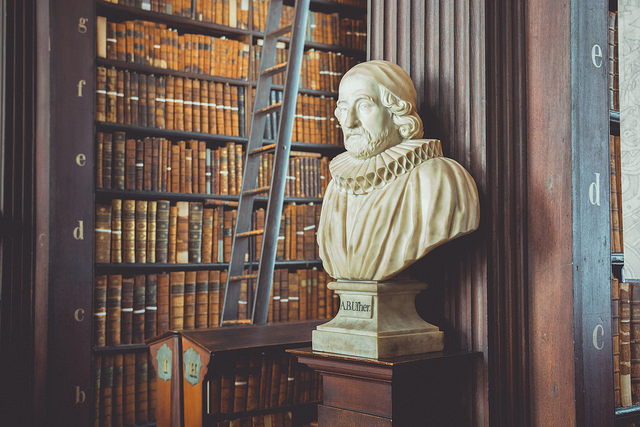Some 13 men have had their names put forward for Trinity’s new Old Library bust campaign – a project designed to commemorate female scholars.
And staff and students, in a nomination campaign launched by Provost Patrick Prendergast last September, have nominated 15 living figures for the campaign, despite a stipulation that the subjects must be deceased.
Prendergast initially tweeted the list of 192 nominees – featuring Gay Byrne, Oscar Wilde, Martin Luther King and Christopher Hitchens – earlier today, before removing the tweet and reposting it several hours later.
“Delighted to receive over 180 nominations for the female sculptures to be introduced to the Long Room of the Old Library”, he wrote this evening. “However, some are invalid due to being male and living! Thank you.”
The current collection of busts on display consists solely of male scholars, including Aristotle, William Shakespeare and Isaac Newton.
Prendergast also wrote in September, in an email to all staff and students, that subjects of the busts should be scholars – following “the principles used for previous commissions in the 19th Century”. But many nominees, including reality TV star Caitlyn Jenner and Queen Elizabeth I, do not appear to have a history of scholarship.
The 15 living women on the list include Nobel peace prize laureate Malala Yousafzai, former president and current chancellor of Trinity Mary McAleese and her predecessor, former president and Trinity chancellor Mary Robinson and Irish singer-songwriter Enya.
Other notable nominees include novelist Maeve Binchy, philosopher Hannah Arendt, social theorist Simone de Beauvoir, painter Artemisia Gentileschi and psychoanalyst Anna Freud.
Two of the nominees, mathematicians Katherine G Johnson and Mary Jackson, were portrayed in the 2016 film Hidden Figures.
Both women after whom elements on the periodic table were named, Marie Curie and Lise Meitner, have been nominated, as has Curie’s daughter, scientist Irene Joliot-Curie.
Last November, emails seen by TheJournal.ie revealed that a number of Trinity staff had objected to Prendergast’s phrasing of his proposal to make Trinity’s public spaces more reflective of the diversity of the College.
One staff member wrote: “Should we admit this is a gesture and we know including some or two isn’t exactly going to right the wrongs of history, but that it is that – history – and we are proposing to make a change for the present and the future generations?”
The absence of women in the collection was highlighted in 2014 by American journalist and social commentator Mona Eltahawy when she spoke to the University Philosophical Society (the Phil).
Internal emails seen by TheJournal.ie showed that College has been considering a commission for sculptures of women since as far back as February last year.
The final decision will be made by a committee chaired by the Provost.
Women were first admitted to study in Trinity in 1904. George Salmon, who served as Provost from 1888 until his death, once infamously said: “Over my dead body will women enter this college.”
Almost immediately after Salmon died in 1904, Trinity, under Provost Anthony Trail, allowed women to enrol in the College, the first of the historic universities in Britain and Ireland to do so.
Isabel Marion Weir Johnston, the first woman to register in the College, is a nominee on the list.







